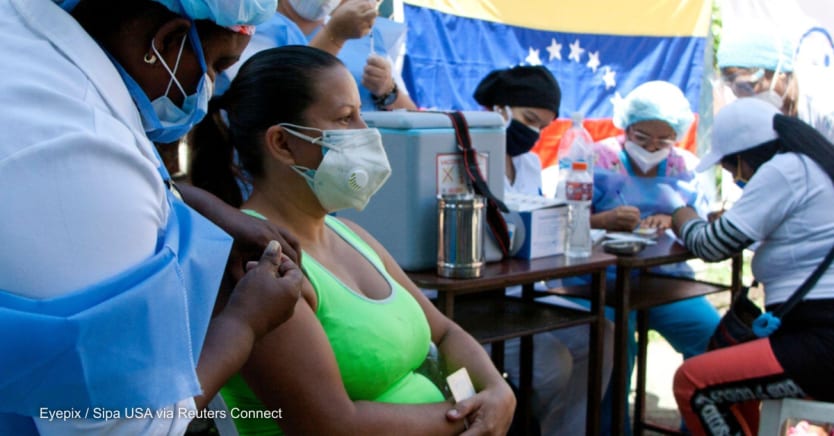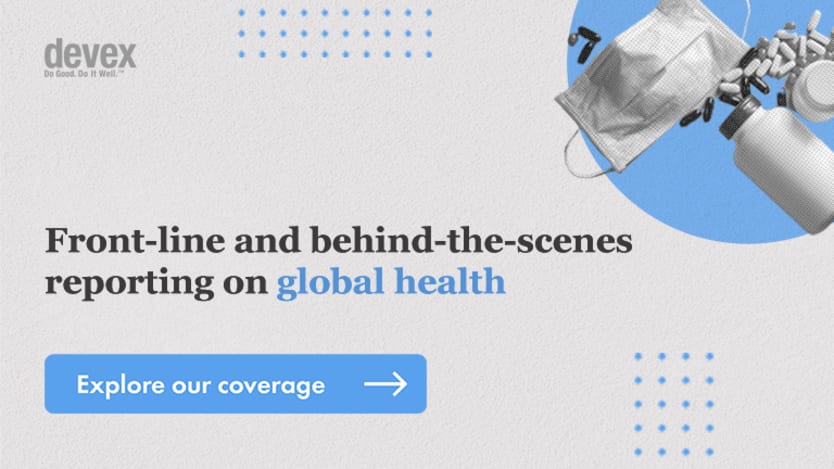
Another vaccine summit is taking place in a renewed attempt to increase coronavirus vaccine access for low- and middle-income countries.
The four-day event starting Friday, called the Summit for Vaccine Internationalism, is hosted by Progressive International and headlined by politicians from several middle-income countries. The summit has been organized in response to the G-7 leaders’ meeting last weekend, which vaccine campaigners described as disappointing and underwhelming.
The new summit’s goal is to bring an end to the pandemic “as quickly as possible by securing COVID-19 vaccines for all.” It is expected to hear commitments from a number of Latin American countries’ health and foreign ministers in helping produce vaccines using their domestic manufacturing capacities.
“It will not be the last step in ending the pandemic, but it can prove a significant one.”
— James Schneider, communications director, Progressive InternationalAccording to a news release shared with Devex, Bolivian Foreign Minister Rogelio Mayta Mayta, for example, plans to look into expanding the country’s deal with Canadian manufacturer Biolyse for the production and export of COVID-19 vaccines.
However, that deal faces a hurdle as the manufacturer does not have the license to produce any COVID-19 vaccines. Biolyse reportedly contacted Johnson & Johnson for a license transfer request to produce the latter’s one-shot COVID-19 vaccine, but the request was refused, according to a news release in May.
Biolyse can ask authorization from the Canadian government to make the vaccine for humanitarian purposes by implementing the TRIPS agreement granting it compulsory licensing. However, the Canadian government has been among the governments opposing a TRIPS waiver at the World Trade Organization.
Sign up for Devex CheckUp
The must-read weekly newsletter for exclusive global health news and insider insights.
Politicians from Cuba and Venezuela, meanwhile, who are also participating in the summit, are expected to use the summit as a platform against the United States government. Leaders from these two countries have repeatedly complained of U.S. sanctions as impeding their efforts to secure and produce COVID-19 vaccines.
Summit organizers however are not concerned that politicians could use the summit for geopolitics.
“The Progressive International exists to unite, mobilise and organise progressive forces — and that is exactly what we are doing with this Summit. We are using our convening capacity to create a platform for collective action that can turn the dial towards justice,” said James Schneider, communications director at Progressive International.
“We are witnessing the first steps in the creation of a new international health order based in solidarity, not charity,” he added.
Governments participating in the summit will discuss a number of proposals to advance the vaccine agenda, including considering a platform for sharing progress on vaccine candidates and sharing manufacturing capacity. Some of the participants, such as Cuba, have five vaccine candidates, two of which are in late-stage trials and have been administered domestically. Mexico also has a vaccine candidate that it hopes to be ready by the end of the year.
There will also be discussion on “collective disobedience” to override intellectual property protections via national legislation, which according to the news release, would introduce “a credible threat to the monopoly pharmaceutical model currently at play.”
“It will not be the last step in ending the pandemic, but it can prove a significant one. If the alliance works toward collective disobedience, it could be a major breakthrough,” said Schneider.
Supporters of the “people’s vaccine” movement hope the summit would lead to concrete commitments to produce more successful vaccines in low- and middle-income countries.
“I think that given the fiasco at the G-7 last weekend, any moves by developing country governments and vaccine producers to push ahead with steps to increase vaccine access in developing countries are welcome. We need to see just these kinds of practical steps taken,” said Max Lawson, head of inequality policy at Oxfam.





